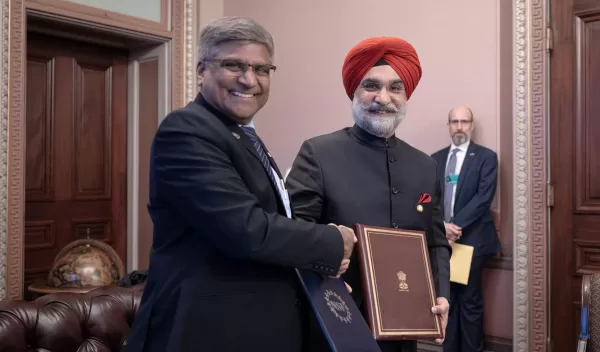
NSF signs U.S.-India implementation arrangement to streamline the process of funding projects between the two nations
The U.S. National Science Foundation and India signed an implementation arrangement that streamlines the selection and funding process of research projects from scientists and engineers from the United States and India. India's Ambassador to the U.S., Taranjit Singh Sandhu, joined NSF officials in the signing ceremony held yesterday at the White House as part of the U.S.-India Initiative on Critical and Emerging Technologies dialogue.
Across the U.S. and India, industry and academia are fueling new discoveries and technological developments. Through international collaboration and the sharing of ideas, resources and best practices between like-minded partners, it has been demonstrated that great things can be accomplished. The opportunities under this arrangement are broad and can nimbly adjust to strategic priorities and researcher interests in computer science and engineering, geosciences, math and physical sciences, engineering, and emerging technologies.
"Through the creation of these opportunities, we are emphasizing to the science and technology communities and the world that our governments are serious about breaking down barriers and facilitating collaboration," said NSF Director Sethuraman Panchanathan. "We look forward to this implementation arrangement, which will open up new vistas for strategic collaborations at speed and scale and leverage the strong scientific and cultural connections between the U.S. and India."
In the past five years, NSF has invested over $146 million in collaborative research activities with scientists, engineers and educators across India. These partnerships have supported new economic opportunities and discoveries that are transforming and leading innovation that will benefit the world.
Last August, NSF announced 35 awards connecting researchers from universities across the U.S. with scientists and engineers at several of India's Technology Innovation Hubs. Through these joint U.S.-India research projects, principal investigators from both nations are bringing their expertise together to accelerate the development of new technologies, tools and systems for mutual societal and economic benefit.
"The signing of the new implementation arrangement is a significant step. It will bring our scientific agencies and institutions closer and open new windows for joint research in strategic and technical areas, which would positively impact the prosperity of our peoples," said Ambassador Sandhu.
To learn more about NSF's international collaborations, visit nsf.gov.
